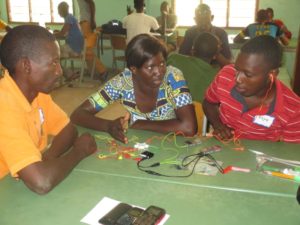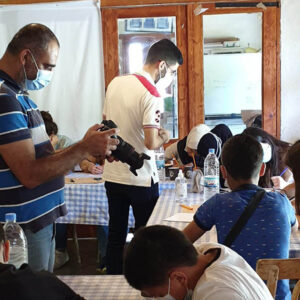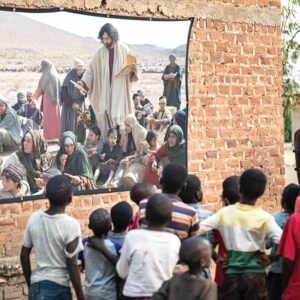Everyone loves a good story
Jesus knew it. He didn’t engage in debates to convince people to believe in God. Instead, He told STORIES about people whose lives were changed-so they could listen and identify, without feeling confronted and condemned. He KNEW the power of a good story! And THIS is why the development of oral Bible stories is at the HEART of our School of Storying. But what does this process of story development actually look like?
In a workshop setting, via translators, a StoryRunners team coaches speakers of the local language as they develop the stories in their own language. Our goal is to always ensure that our stories are “BONA-fide“: Biblically Accurate, Orally reproducible, Naturally told and Appropriate to the culture.

Our 2017 Orlando School of Storying participants praying before going to a nearby mall to reach out to anyone who would be willing to hear His story.
Biblically Accurate
For example, in Southeast Asia, on a SOS project in a language without a Bible, we discovered there are two possible words for “spirit”. After learning that we had wrongly used the word that refers to the spirit of a dead person, we knew we needed to use the other word for “spirit”. Ensuring we use the right words in the local language to convey the meaning of the Biblical text accurately can be a tedious process of discovery. But it’s a crucial step that we must always take!
Orally Reproducible
It’s important that we keep our stories short enough to be easily learned and retold. Each Bible story is no more than two to three minutes long.
Naturally Told
In local languages, there are often natural storytelling styles, including, for example, culturally appropriate ways to introduce stories and characters as well as the “pause” time for transitioning between stories-all of which make the story easier to retell. In the Anufo language in Togo, one SOS workshop participant always began his story by saying “My story flies and flies and lands on”, and he finished his introduction with the name of the main character. Part of the process of developing Bible stories includes finding those cultural nuances to ensure that the stories sound natural in that language.
Appropriate to the Culture
 Some words have special meaning in the culture. In the Fulfulde Borgu language, the word used for the oil that Samuel pours on David’s head when he anoints David as the king of Israel is the same word used to describe the special oil, derived from milk, used to anoint chiefs. The Fulfulde really connect with this detail in the story (not to mention that David was a shepherd, and they are nomadic people). The use of this word is a simple but powerful detail that can help people connect to the gospel through their culture.
Some words have special meaning in the culture. In the Fulfulde Borgu language, the word used for the oil that Samuel pours on David’s head when he anoints David as the king of Israel is the same word used to describe the special oil, derived from milk, used to anoint chiefs. The Fulfulde really connect with this detail in the story (not to mention that David was a shepherd, and they are nomadic people). The use of this word is a simple but powerful detail that can help people connect to the gospel through their culture.
Every SOS trainer will quickly tell you how exciting and rewarding it is to see local participants develop and tell these stories in their own language. Relationships grow as they see cultural barriers fall because of the bridges the Holy Spirit builds through His Word. It’s what makes saying goodbye at the end of each mission trip so difficult for both our trainers and the participants. But before any of this can happen, we must do the hard work of making sure the stories are “BONA-fide”. When they are, we can celebrate-because we know the stories that we leave with each group are going to be effective, powerful tools for evangelism and for growing communities of faith.
Thank you for partnering with us in taking these life-changing stories to those who have never heard them!
« 5 Lessons Learned While Living on Mission Intersection: Stories Impacting women in Ethiopia »










